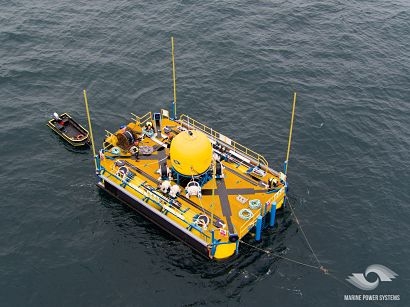
The test took place over 12 months at the FaBTest marine test site, proving the functionality of the 1:4 scale device across a range of sea states and – crucially – that it is able to generate zero-carbon electricity from ocean waves. The results pave the way for MPS to progress with the design, manufacture and testing of a full-scale version of the WaveSub in the coming months.
“The wrap-up of the WaveSub testing at FaBTest is a significant step forwards for MPS and we’re delighted with what we have achieved” said Dr Graham Foster, Chief Technology Officer at MPS, commenting on the completed tests. “We have demonstrated the fundamental USP’s of WaveSub such as its inherent ease of transportation, deployment and maintenance; we have achieved a high level of technical capability with the remote control, monitoring and communication systems; and importantly we have shown we are able to generate grid compliant electricity from ocean waves”.
Dr Foster added that the MPS team has been fantastic, successfully managing a project of significant complexity. The design, manufacture and commissioning of WaveSub was highly demanding, requiring the design, procurement and assembly of thousands of components from many dozens of suppliers. Securing consents, regulatory approvals and ensuring H&S compliance was a substantial project in its own right, taking well over a year. Installation of the entire test site including moorings, cardinal marks, grid emulator buoy, power umbilical and the WaveSub device was a considerable marine operation. The testing lasted a year and included trouble-shooting and maintenance out at sea in often inclement weather conditions. The project concluded with the decommissioning of the test site last month.
“An R&D project of this scale and complexity was never going to been plain sailing - we’ve had to deal with various issues and setbacks along the way” Foster said. “Unsurprisingly some things took longer than we originally planned, and some aspects like the grid emulator buoy and communications proved particularly troublesome. However, the team remained focused and positive even when complex challenges presented themselves, using their extensive collective skills to find solutions. Support from the highly capable local supply chain and the team at FaBTest was invaluable - with their help we successfully overcame our problems and gathered vital data on the performance and functionality of WaveSub. The knowledge we’ve accrued over the last year will be duly fed into the full-scale WaveSub project and will be essential for reducing risks and ensuring a successful outcome.”
WaveSub is a wave energy device designed to generate electricity by harnessing energy from the continual orbital motion of waves under the surface of the sea. Following completion of manufacturing and commissioning in Pembroke Dock, Wales, WaveSub was towed to marine energy test site FaBTest in 2018.
Earlier this year MPS revealed its plans for expansion into the floating offshore wind sector with two new devices that offer a viable solution to wind energy generation in deep water locations; DualSub, which captures both wave and wind energy, and WindSub which captures wind energy only. These devices have successfully completed tank scale prototype testing, detailed computational simulation and cost of energy modelling. Positive results have led MPS to accelerate the development of WindSub and DualSub to large-scale prototype, with the objective of bringing them to a point of market readiness in a similar timeframe to WaveSub.
The development of WaveSub has been supported with over £3 million of European Regional Development Funds, administered by the Welsh European Funding Office, which has been vital to the success of this operation. It has also received support from the Welsh Government which recently advocated marine energy as a key area for investment as it seeks to fulfil its commitment to achieving zero carbon emissions by 2050.
For additional information:

